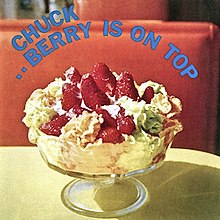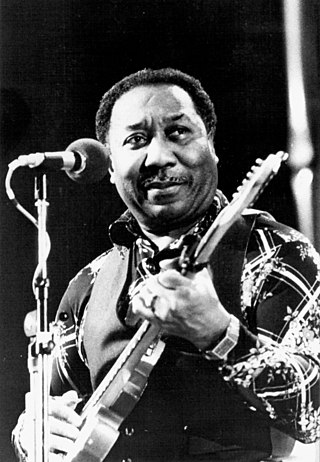
Muddy Waters (1913–1983) was an American blues artist who is considered a pioneer of the electric Chicago blues and a major influence on the development of blues and rock music. He popularized several early Delta blues songs, such as "Rollin' and Tumblin'", "Walkin' Blues", and "Baby, Please Don't Go", and recorded songs that went on to become blues standards, including "Hoochie Coochie Man", "Mannish Boy", and "Got My Mojo Working". During his recording career from 1941 to 1981, he recorded primarily for two record companies, Aristocrat/Chess and Blue Sky; they issued 62 singles and 13 studio albums.

Chess Records was an American record company established in 1950 in Chicago, specializing in blues and rhythm and blues. It was the successor to Aristocrat Records, founded in 1947. It expanded into soul music, gospel music, early rock and roll, and jazz and comedy recordings, released on the Chess and its subsidiary labels Checker and Argo/Cadet. The Chess catalogue is owned by Universal Music Group and managed by Geffen Records and Universal Music Enterprises.

"Back in the U.S.A." is a song written by Chuck Berry that was released in 1959 and was a top 40 hit. A cover version in 1978 by Linda Ronstadt was also a hit.

Brownsville Station is an American rock band from Michigan popular in the 1970s. Original members included Cub Koda (guitarist/vocalist), Mike Lutz (guitarist/vocalist), T.J. Cronley (drummer), and Tony Driggins (bassist/vocals). Later members included Henry "H-Bomb" Weck (drummer) and Bruce Nazarian (guitarist/vocalist).
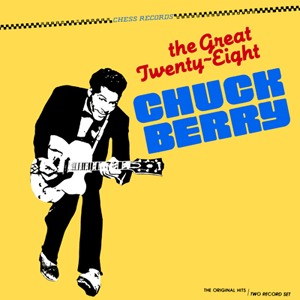
The Great Twenty-Eight is a compilation album by American musician Chuck Berry, released in 1982 on Chess Records. In 2003, the album was ranked number 21 on Rolling Stone magazine's list of the 500 greatest albums of all time, maintaining the rating in a 2012 revised list, the second-highest ranking compilation on the list after The Sun Sessions by Elvis Presley. It was ranked number 51 in the 2020 reboot of the list.

"Roll Over Beethoven" is a 1956 hit song written by Chuck Berry, originally released on Chess Records single, with "Drifting Heart" as the B-side. The lyrics of the song mention rock and roll and the desire for rhythm and blues to be as respected as classical music. The title of the song is an imperative directed at the composer Ludwig van Beethoven to roll over out of the way and make room for the rock and roll music that Berry was promoting. The song has been covered by many other artists, including the Beatles and the Electric Light Orchestra. Rolling Stone magazine ranked it number 97 on its list of the "500 Greatest Songs of All Time".
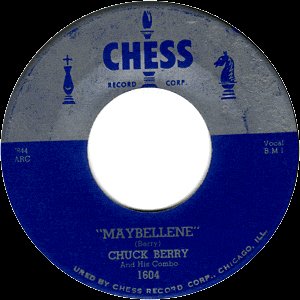
"Maybellene" is a rock and roll song by American artist Chuck Berry, adapted in part from the Western swing fiddle tune "Ida Red". Released in 1955, Berry’s song tells the story of a hot rod race and a broken romance, the lyrics describing a man driving a V8 Ford and chasing his unfaithful girlfriend in her Cadillac Coupe DeVille. It was released in July 1955 as a single by Chess Records, of Chicago, Illinois. Berry's first hit, "Maybellene" is considered a pioneering rock and roll song. Rolling Stone magazine wrote of it, "Rock & roll guitar starts here." The record was an early instance of the complete rock and roll package: youthful subject matter; a small, guitar-driven combo; clear diction; and an atmosphere of unrelenting excitement.

After School Session is the debut studio album by rock and roll artist Chuck Berry, released in May 1957 by Chess Records. With the exception of two tracks, "Roly Poly" and "Berry Pickin'", all selections had been previously released on 45 rpm singles. It is the second long-playing album released by the Chess label.
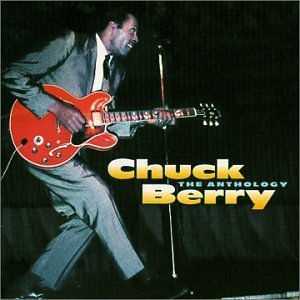
Anthology is a two-disc compilation album by American rock and roll musician Chuck Berry released on July 27, 2000, by Chess Records. It duplicates in its entirety the previous anthology The Great Twenty-Eight ranked at No. 21 on the Rolling Stone 500 greatest all time albums list, as well as the entirety of the later Definitive Collection issued in 2006 as part of the Universal series. The album was later reissued and packaged in 2005 as part of the Universal Records Gold series, and simply retitled Gold. It charted at No. 110 in the UK Albums Chart.

One Dozen Berrys is the second studio album of Chuck Berry, released in March 1958 on Chess Records, catalogue LP 1432. With the exception of five new songs, "Rockin' at the Philharmonic," "Guitar Boogie," "In-Go," "How You've Changed," and "It Don't Take but a Few Minutes," and one alternate take, "Low Feeling", all tracks had been previously released on 45 rpm singles. It was also released in the United Kingdom. In 2012, Hoodoo reissued the album with Chuck Berry Is on Top on the same CD. Sheldon Recording Studio, where all of the recordings were made, was located at 2120 South Michigan Ave. in Chicago and eventually became Chess Studios.

Rockin' at the Hops is the fourth studio album by rock and roll pioneer Chuck Berry, released in July 1960 on Chess Records, catalogue LP 1448. With the exception of four tracks, "Down the Road a Piece," "Confessin' the Blues," "Betty Jean," and "Driftin' Blues," all selections had been previously released on 45 rpm singles.

The London Chuck Berry Sessions is the sixteenth studio album by Chuck Berry, and consists of studio recordings and live recordings released by Chess Records in October 1972 as LP record, 8 track cartridge and audio cassette. Side one of the album consists of studio recordings, engineered by Geoff Calver; side two features three live performances recorded by the Pye Mobile Unit, engineered by Alan Perkins, on February 3, 1972, at the Lanchester Arts Festival in Coventry, England. At the end of the live section, the recording includes the sounds of festival management trying in vain to get the audience to leave so that the next performers, Pink Floyd, can take the stage; the crowd begins chanting "We want Chuck!". His backing band were Onnie McIntyre (guitar), Robbie McIntosh (drums), Nic Potter (bass) and Dave Kaffinetti (piano). Both McIntosh and McIntyre would later form The Average White Band.

St. Louis to Liverpool is the seventh and tenth overall studio album by American musician Chuck Berry. Released in 1964 by Chess Records. It peaked at number 124 on the US Billboard album chart, the first of Berry's studio albums to appear on the chart. Music critic Dave Marsh called St. Louis to Liverpool "one of the greatest rock & roll records ever made".

Two Great Guitars is a studio album by Bo Diddley and Chuck Berry, released in August 1964 by Checker Records, a subsidiary of Chess Records. It was the first studio album issued by Berry after his release from prison in October 1963.
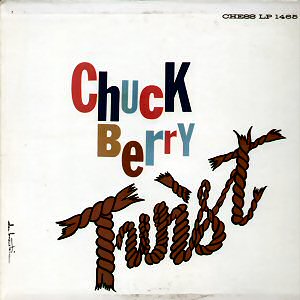
Chuck Berry Twist is the first compilation album by Chuck Berry, released by Chess Records in February 1962, during Berry's imprisonment. The title was an attempt to capitalize on a new dance craze, the Twist, introduced by Chubby Checker in 1960, even though none of the songs musically conformed to the Twist style. The album was reissued a year later with a new title, More Chuck Berry. An album with that title was released in the UK by Pye International Records in 1964, featuring the same cover but a completely different track listing.
"School Days" is a rock-and-roll song written and recorded by Chuck Berry and released by Chess Records as a single in March 1957 and on the LP After School Session two months later. It is one of his best-known songs and is often considered a rock-and-roll anthem.
"Too Much Monkey Business" is a song written and recorded by Chuck Berry, released by Chess Records in September 1956 as his fifth single. It was also released as the third track on his first solo LP, After School Session, in May 1957; and as an EP. The single reached number four on Billboard magazine's Most Played R&B In Juke Boxes chart, number 11 on the Most Played R&B by Jockeys chart and number seven on the R&B Top Sellers in Stores chart in the fall of 1956.

"The Sky Is Crying" is a blues standard written and initially recorded by Elmore James in 1959. Called "one of his most durable compositions", "The Sky Is Crying" became a R&B record chart hit and has been interpreted and recorded by numerous artists.

I've Got a Tiger by the Tail is an album by Buck Owens and his Buckaroos, released in 1965. It reached Number one on the Billboard Country charts and Number 43 on the Pop Albums charts.

"Almost Grown" is a song written and recorded by Chuck Berry. It was released as a double A-side with "Little Queenie".
